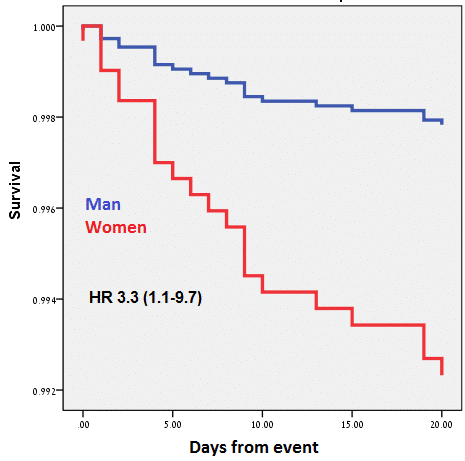Background: Women are usually protected against coronary artery disease due to hormonal and risk-factor profile. Previous studies have suggested a worse outcome in women hospitalized with ACS as compared to men. ACSIS registries have shown 3-fold higher mortality rates among women after ACS. However, when adjusted to age this difference does not exist. We aimed to compare the risk-profile and outcome between young (≤55) women and men admitted with ACS
Methods: We analyzed the clinical characteristics, management strategies, and outcomes of man and women, 55 years old or younger enrolled in the biannual Acute Coronary Syndrome Israeli Survey (ACSIS) between 2000 and 2013.
Results: Among 13,432 patients enrolled, 3949 (29.4%) were 55y old (407 women and 3542 men). Woman had a higher proportion of diabetes mellitus and hypertension with lower rates of active smocking (p0.001 for all). Women present less often with typical angina and ST elevation but still had higher Kilip and GRACE score. After adjustment for GRACE score, diabetes mellitus and enrolment year, women had a lower likelihood to receive PCI during hospitalization (OR 0.6, p=0.007). Women had a worst outcome with higher rates of all-cause mortality at 7 days, 30 day, and one year as well as MACCE at 30 day. After adjacent Female sex remained an independent risk factor for mortality [HR 3.3(1.1-9.7)] and MACCE [HR 3.3(1.3-7.9)] at 30 day (Figure) and a strong trend towards increase one year mortality [HR 2 (0.99-2.3)].
Conclusion: In young patients admitted with ACS, women are a unique high-risk group that presents a diagnostic challenge for clinicians. Women receive less invasive therapy during hospitalization and have worst short-term outcomes.


